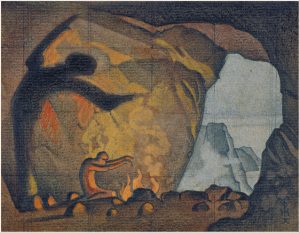With this part of contemporary Theosophy we modify Rudolf Steiner lectures, in our consideration, from the year 1917, Fourteen Lectures, Dornach, 29 September to 28 October 1917, GA No. 177, after more than 100 years.
Quote: “for order will only arise out of this chaos when one will understand from what this chaos has arisen. It has arisen from an unspiritual grasp of reality – yes, from an unspiritual grasp of reality. One does not ignore the spiritual world with impunity. One can believe that one can ignore the spiritual world with impunity, one can believe that one can indulge in concepts and ideas in the world that are merely taken from the world of the senses, one can believe that, and that is the general belief of humanity today. But it is not true. No! The most erroneous belief that mankind has ever been able to cherish is that – if I may express myself trivially – that the spirits put up with being ignored. For my sake, understand it as an egoism, as a selfishness of the spirits, but in the spiritual world a different terminology applies than here in the sensual-physical world. So take it for my sake as a selfishness of the spirits, but the spirits take revenge when they are ignored here. It is a law, it is an absolute necessity: the spirits take revenge. And among the many characteristics that can be given for the present, this one is also correct, that one can say: The revenge of the spirits for being ignored for so long.”
We modify the concept of revenge at this point, surveying the theosophical foundations through the four spiritual impulses of the last 150 years (H.P.B, R. Steiner, Agni Yoga, Tibetans/A.A.B.).
The core of the soul, enveloped by the astral emotional life, reaches a point after death and a certain time thereafter, where it expects the fulfilment of the wishes, hopes and promises it has brought with it.
Depending on the content of the expectations, these are a paradise, heaven or the personally appearing God who rewards or punishes. Atheists expect nothing, but their soul life goes on painfully nonetheless.
The spiritual beings for whom the soul now seeks and strives according to the mediated concepts and images from religion or ideology, however, have a frequency of vibration in the ethereal being that is peculiar to them in each case, which they are not prepared to change for the arriving souls, otherwise they endanger their own evolution. Although the arriving souls in ascension offer their own acquired fine-material vibrational frequency, they are attracted or repelled according to the frequency of the higher beings. This takes place in the astral space of the earthly, ascending step by step. If, during incarnation, they have not succeeded in giving their own vibration a spiritual note through the study of spiritual science and its practical everyday application, no connection takes place. The soul thus thrown back remains there with souls of equal status, related to the level, as it stands. The term “revenge” is not applicable to this.
Furthermore, R. St. conveys in his lectures that there is no morality on the levels of spirit beings, and from this he develops the assertion of acts of revenge by spirit beings. We supplement this account and classify it differently.
From today’s point of view, morality is a perfectly sensible set of rules for human coexistence, even without being based on insight. It is a framework that should develop into ethical insight through growing realisation of the karmic consequences of one’s actions. Precisely such ethics, however, distinguish the spiritual beings on the higher planes; they no longer need a morality with external rules. The impression created by R.St. of an immoral community of gods, without mentioning ethics as an advanced development, is at least regrettable. Such an impression could create an underlying fear of the subtle world; such timidity always harms spiritual development. So the claimed revengeful treatment of the higher spiritual beings can be regarded as non-existent. Their reaction to approach serves their own protection and this self-protection may, as formulated by R.St., be regarded in a certain sense as a kind of self-centredness of the spirits, although in the same breath he points to the different terminology in the spiritual world. Those who fulfil the condition for the gradual approach are not repelled.
R. St. continues in his remarks by citing chaos on the physical plane as a consequence of the process he describes. Through rejection, the souls not endowed with spiritual knowledge would be reborn in their next incarnation with destructive intentions and provide for the constant chaos on the physical plane. This arguably astral destructive would be triggered by the vengeance of the spirits.
Logically, we also consider this conceptualisation by naming it “disappointment” or, in more modern terms, “frustration”. This is triggered by the process already described in which the expectation of the higher world and the experienced reaction of the soul do not match at all. (As an extreme example, the promised 100 virgins for Attenate in extreme Islam may suffice) The disappointment runs deep and turns into a partly aggressive impulse to destroy the source of the disappointment. This impulse is the astral (emotional) baggage for the following incarnation.
All religions that lack the truth of reincarnation produce, through their promises of salvation, the astral-soul disappointment described above in the post-death state and are, spiritually speaking, a dead end with an impenetrable wall at the end.
Countless atheists experience severe mental suffering, because although they do not expect an after-death life, they suddenly find themselves in a state and process that is indefinable to them. This state is comparable to that of a deaf blind person. It is only possible to actively deal with a supersensible world if sensual-spiritual concepts, i.e. knowledge, have been formed for it. In this context, the open or subtle ideology on which these people have based their atheism acts like a substitute religion.
Those religions or philosophies which contain the truth of reincarnation are not affected by this process. Thus, the advancement to the higher planes and the conscious dwelling time there for the individual soul is determined by its spiritual development.
The consequences of disappointment or frustration then show themselves in the next incarnation. Common to all the disappointed is the tendency to opposite extremes. Since the period between death and new birth varies according to the soul, direct conclusions about the past should only be drawn with caution.
However, from all these masses of disenchanted ones a danger is developing, which shows itself again and again in humanity in cyclic waves: When, as an unconscious reaction to disappointing religions, a large mass projects its “idolatry” onto individuals instead and exaggerates them. Then, as a cyclically occurring consequence, we have a wave of fascist regimes, as they have developed and are still developing in the current world situation. Morally and ethically questionable individuals who lie and cheat become messiah-like revered “leaders” and function as gods of a fascist substitute religion.
R. Steiner is to be thanked for decoding the described process for us in his aforementioned lectures; our changes of terminology do not correct the true principle.
In coming Waymarks, some more particular occult fundamentals from this lecture cycle will be discussed. In the member lectures originally planned by R. Steiner, a general publication was not intended. The reason why this was nevertheless done need not be elaborated here and now. The lectures therefore contain contents which at that time were not intended for the public and also not for incarnated spiritually interested people or students.
As can be gathered from the scattered hints in Helena Roerich’s diaries and the books of the Tibetan Master, the disclosure of some occult content in Steiner’s lectures was not intended from the Brotherhood’s point of view. R. Steiner had a different point of view on this, which we do not evaluate here. What matters today is to use these contents and indications (they are already well hidden in the mass of lectures) for the benefit of seekers and students in a meaningful way.





